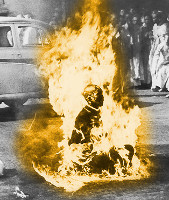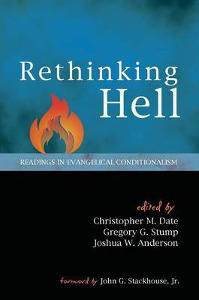Earlier this month I spoke at the annual conference of the Conditional Immortality Association of New Zealand, on divine holiness and hell. Defenders of the doctrine of eternal torment sometimes assure us that eternal torment in hell is necessary because God is very, very holy. But a biblical theology of God’s holiness actually offers no support at all to this view on hell. In fact, God’s holiness as depicted in the Bible offers more support for the doctrine of annihilationism – the view that God will finally remove all evil and those who commit it from creation. If you have 25 minutes to spare, take a listen!
Tag: annihilationism Page 1 of 2

There is a way of using the Bible to support your theology that really just amounts to doing everything in your power to avoid what the Bible has to say so that you can escape from the ravages of Scripture with your precious doctrine still intact.
Without naming names, over the last year I have had several conversations about the doctrine of hell with people who advocate the doctrine of eternal torment, where they argued in a manner very much like John in the following conversations (right down to the same phraseology, eg “equally likely as an interpretation” and “use Scripture to interpret Scripture”):
Karen: Hi John. Have you read passage A? It seems to pretty clearly deny the doctrine of eternal torment. It says that one day the lost will be destroyed. They will die and be gone. Don’t you agree?
John: No, I don’t think so. I think eternal torment is equally likely as an interpretation.

Based on the evidence currently available, we should view Pope Francis as an annihilationist, and attempts from within the Vatican to downplay this fact are unconvincing. The current Pope does not believe the doctrine of eternal torment, affirming instead the biblical doctrine of conditional immortality: That the saved will have eternal life, but the lost will not live forever – not in hell or anywhere else.

What would you think if I offered to reward you by killing you? Would you think I was mad? Suppose that I was a well-known preacher who had steadily grown in popularity, so that I now pastored a large church, wrote and sold many books, was keynote speaker at conservative conferences and so on. And then one day I told, not just you but the whole world, that for people who don’t know Jesus to be annihilated forever would actually be a reward, throwing in a claim that really, it’s what they want anyway? Of course it would be just as mad as the person who thought that killing you would be a reward, but you might look at my rise in popularity and influence and wonder at just what point I crossed the line where I would think that this was a healthy thing, not just to believe, but to tell the world.
Not long ago, John Piper tweeted thus:

Life is worth nothing. Having eternal life is worth nothing. Nothing at all. Enjoying eternity with God is not something to be prized, so if you lose it, you have lost nothing. No big deal. It has no value. If you lost your life, or you had the chance of eternal life taken from you (when it is actually a real possibility), then you have lost nothing at all. Zip.
If you tell anybody that this is not so, then you’re not a real Christian, but a phony. If you deny these things, then you’re accursed. You must tell people that these things are true, because if you tell them anything else, you’re not being loving. You’re just letting them die in their sins. If you want to be faithful to God, then you must tell people that their lives are worthless, and that there is no value in eternal life. This is an essential part of defending the Gospel.
Of course none of that is true. It is bizarre, false, and certainly not a view that I would ever call biblical or Christian. And yet, I have just read an article by the head of a major Evangelical apologetics organisation in which he claimed all of these things.

The traditional doctrine of hell is surely a major liability in the task of Christian apologetics. At the least, the tension between proclaiming the goodness and love of God should give you a reason to ask afresh whether or not he will cause the eternal suffering of human beings.
Podcast: Play in new window | Download
What did the early Church Fathers have to say about the doctrine of eternal punishment?
Every now and then I make a video for Rethinking Hell, and I’ll share some of those here as they are produced. The purpose of this one was to provide a succinct reply to the comment that is sometimes made that the doctrine of hell as a place of eternal torment is the view that all the Early Church Fathers held. I hope you find it interesting!

Recently I posted some thoughts on what I see as the really inappropriate verbal and written attacks being carried out by professing Christians against Mark Driscoll, a pastor at Mars Hill Church in Seattle. The inevitable happened, and some people (whether here at the blog or elsewhere) suggested that maybe I would be more supportive of some of those attacks if I didn’t happen to agree theologically with mark. Really, it was suggested, I was being over sensitive when he was being criticised and giving a free pass to anything he says or does just because I’m on his “side,” doctrinally speaking. That, some thought, is why I don’t think he should be called a jerk, an ass, a slime ball, a “douchebag” and worse. It’s not that I think such conduct is wrong, I’m really just biased and over-sensitive about my theological buddies being disagreed with.
As a response to my concerns about the way Mark is being treated, this is actually a fallacious approach. It’s the old ad hominem fallacy, suggesting that my criticism of the treatment being dished out can be dismissed because of some other feature I have – like agreement with Mark on theological matters. Of course this is a mistake, and even if I agreed completely with Mark on theological matters the concerns that I raised about the conduct of fellow Christians should be taken no less seriously than if I disagreed with Mark on every point of doctrine imaginable. So this kind of reply is a non-starter.
But, as I said in the comment thread of my previous blog entry, I actually don’t agree with Mark at every point, and even some of the things for which he is now lambasted by his spiritual family are things that I disagree with him on. I just choose not to belittle him for them. One such thing is Mark’s concern over the “chickification” of Christianity, and the way he can use that concern to dismiss points of view that really have nothing to do with it. Here’s an area where I think appropriate criticism is required. Although I agree with part of what Mark – and many others for that matter – say about the feminisation of the Christian faith, I think he misunderstands and badly misapplies the principle to which he appeals, in a way that many other evangelicals also do with different principles. So to reassure people that I’m not a “Mark Driscoll sycophant,” I wanted to unpack some of the concern I have here – maybe even for the purpose of modelling the kind of criticism I think is appropriate, having already vented a bit about what’s not appropriate.
Podcast: Play in new window | Download

Do some people get burned worse than others in hell? Some people think so.
This is the second blog entry in a row on the way that some evangelicals (fewer all the time, thankfully) insist on saying that the Bible – and the New Testament in particular – teaches that some people are going to suffer eternal torment in hell. I won’t make too much of a habit of it, but this entry was prompted by one of the comments on the previous one.
Some have said that the New Testament teaches that there will be degrees of suffering in hell throughout eternity. In the traditional vision of hell as a torture chamber of fire and sulphur, you could think of some people being roasted at 500 degrees Celsius, while others are merely blistering at 100. In more recent, milder descriptions perhaps people might think of deeper levels of remorse or mental anguish, and perhaps a century from now it will be expressed in terms of some people feeling more angsty or bummed out than others. The point is, although hell is posited as the worst possible state that a person can find themselves in, there will still be some people in hell who can correctly say “things could be worse I suppose.”
This doctrinal claim is made as a reason to reject annihilationism. After all, if the punishment for sin is ultimately death in a straight forward literal sense after the judgement, as annihilationists say, then everyone gets the same punishment. But if there are degrees of punishment in hell then not everyone gets the same punishment, so annihilationism has got to be false.

